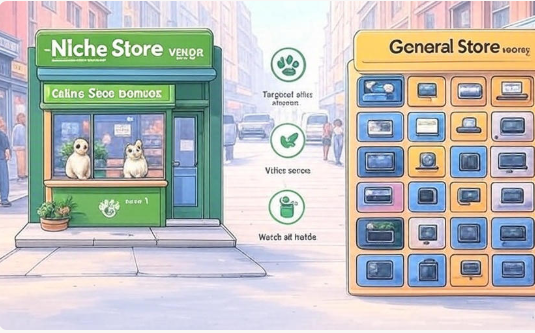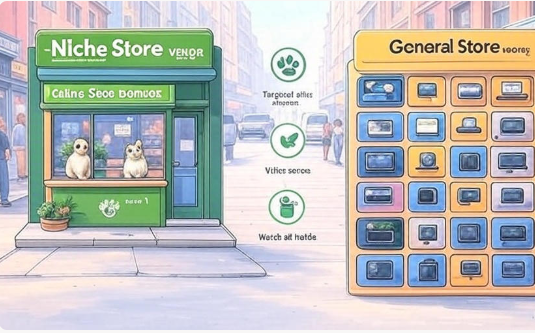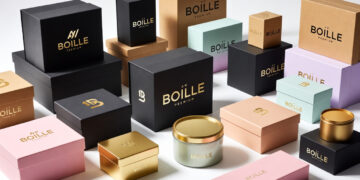In the fast-growing world of eCommerce, one of the foundational decisions that new entrepreneurs must make is the type of store they want to create. The choice often comes down to two key models: niche stores and general stores. Each has its unique benefits, drawbacks, and ideal use cases. Understanding these differences is crucial for building a profitable, scalable, and sustainable online business.
In this comprehensive guide, we will explore the debate of Building a Niche Store vs General Store – Pros & Cons. By the end, you’ll have clarity on which model aligns best with your goals, market understanding, and resources.
What Is a Niche Store?
A niche store focuses on a specific segment of the market. It is tailored toward a well-defined customer base with specific interests, needs, or problems. Examples include stores focused solely on eco-friendly kitchenware, products for pet lovers, or fitness gear for women.
Characteristics of a Niche Store:
- Focused product selection
- Targeted audience
- Specialized marketing
- Strong branding potential
Why Entrepreneurs Choose Niche Stores:
Niche stores offer the opportunity to dominate a segment of the market by building a strong, authoritative presence. They also enable more personalized marketing and usually benefit from higher customer loyalty.
Popular Niche Store Examples:
- Beard grooming products for men
- Minimalist phone accessories
- Organic skincare for sensitive skin
What Is a General Store?
A general store is a multi-category eCommerce store that sells a wide variety of unrelated products. Think of it as a digital version of a department store. The goal is usually to attract a broad customer base and capitalize on trending products.
Characteristics of a General Store:
- Diverse product offerings
- Broader customer base
- Rapid product testing
- Less emphasis on brand identity
Why Entrepreneurs Choose General Stores:
General stores offer speed and flexibility. They are especially popular among dropshippers and eCommerce newcomers who want to test multiple products before settling on a niche or focus area.
Popular General Store Examples:
- Gadget and gift item stores
- Discount product platforms
- Trending products shops fueled by TikTok and Instagram virality
Deep Dive: Pros and Cons of Niche Stores
Advantages of a Niche Store
1. High Conversion Rates
When a visitor lands on a niche store, they immediately see that the store is tailored to their needs. This connection leads to greater trust and improved conversion rates.
2. Easier Customer Targeting
Since the audience is well-defined, ad targeting becomes more precise. Your Facebook and Google Ads can zero in on a narrower group, improving cost-efficiency.
3. Stronger Brand Loyalty
Niche audiences often value authenticity and expertise. A niche store that caters to their specific interests or needs is more likely to earn repeat business.
4. Better Organic Reach via SEO
Search engines favor specialized content. A niche store can rank more easily for targeted keywords because of less competition and clearer topical relevance.
5. Opportunity for Authority Building
As a niche expert, you can build a content marketing strategy (e.g., blog posts, YouTube videos, email newsletters) around your niche, gaining traction and authority in your field.
Disadvantages of a Niche Store
1. Limited Product Scope
You’re confined to a single category or audience. This can limit cross-selling and upselling opportunities unless you carefully curate your product line.
2. Demand Risk
Some niches are seasonal or subject to trends. If demand drops, your store may struggle.
3. Requires Deep Market Knowledge
Success with a niche store requires a solid understanding of your target customer, including their pain points, preferences, and buying behavior.
4. Longer Time to Scale
While niche stores often enjoy better conversions, they may grow slowly compared to general stores because of the smaller target market.
Deep Dive: Pros and Cons of General Stores
Advantages of a General Store
1. Quick and Easy Setup
You don’t need to do extensive niche research. You can import a wide range of products and begin testing immediately.
2. Flexibility in Product Testing
General stores allow you to test various product categories at once. This is ideal for finding winning products based on data.
3. Wide Audience Reach
You can run ads to a variety of demographics and interests. Your potential customer base is much larger than a niche store.
4. Lower Barrier to Entry
Because you don’t need to develop deep niche expertise or branding, general stores are easier to launch for beginners.
5. Viral Product Opportunity
With the right marketing, general stores can take advantage of viral products, especially via TikTok, Instagram, or Facebook.
Disadvantages of a General Store
1. Weak Brand Identity
General stores lack a unified theme. Customers may not remember your store or become loyal because there’s no emotional connection.
2. Lower Conversion Rates
Without a targeted audience, your ad copy and product pages may feel generic, reducing conversions.
3. SEO Challenges
Ranking for multiple, unrelated keywords is more difficult. Your site lacks topical authority, making organic traffic harder to obtain.
4. Complicated Marketing Strategy
You need to create campaigns for multiple products and categories, making your strategy more fragmented and harder to manage.
Building a Niche Store vs General Store – Pros & Cons: Side-by-Side Comparison
Feature/Factor |
Niche Store |
General Store |
|---|---|---|
Target Audience |
Narrow, focused |
Broad, diverse |
Conversion Rate |
Higher due to relevance |
Lower due to generic offerings |
SEO Potential |
Strong for targeted keywords |
Weak, spread across unrelated topics |
Marketing Strategy |
Easier, focused |
Complex, multi-layered |
Brand Recognition |
High potential |
Low potential |
Product Range |
Limited but curated |
Broad, flexible |
Customer Loyalty |
High |
Low |
Store Setup Complexity |
Moderate |
Low |
Ideal For |
Long-term growth and branding |
Quick testing and trend-based sales |
Which Store Type Is Better for Beginners?
For complete beginners, a general store can be a great starting point. It allows you to:
- Test a variety of products quickly
- Learn the ropes of order fulfillment, ads, and customer service
- Understand customer preferences based on real-world behavior
That said, a niche store is a better option if:
- You have expertise in a specific field
- You already know what your audience wants
- You’re building a long-term brand
Transitioning from General to Niche
One common approach is to start with a general store, identify a winning product or product category, and then transition into a niche store. This minimizes risk and helps you make data-backed decisions.
Real-World Example:
An entrepreneur launches a general store and discovers that their pet grooming tools are selling consistently well. They pivot by creating a niche store focused solely on pet care products. With targeted branding and content, they scale to six figures in annual revenue.
Case Studies: Niche vs General in Action
Case Study 1: Niche Store Success
- Store Type: Niche (Organic baby products)
- Strategy: Content marketing and Instagram influencer collaborations
- Results: 8x return on ad spend within 4 months, consistent SEO traffic
Case Study 2: General Store Trend Chasing
- Store Type: General (Gadgets and home tools)
- Strategy: Facebook Ads targeting trending products
- Results: Rapid 5-figure sales in 3 months, but minimal repeat business or brand recognition
Key Takeaway:
Niche stores build sustainable revenue over time, while general stores are better for short-term profits and rapid testing.
Frequently Asked Questions (FAQs)
Is a niche store more profitable than a general store?
Niche stores often generate more profit per customer due to higher conversion rates and customer loyalty. However, general stores can scale faster with the right products.
Which is better for SEO?
Niche stores are significantly better for SEO. Their focused content and keywords allow them to rank more easily and build authority.
Can I start with both models?
Yes, some entrepreneurs run both simultaneously. You can use a general store for testing and move successful products into a niche brand.
Are general stores outdated?
Not at all. While niche branding is trending, general stores still have a place in eCommerce, especially for product testing and trend capturing.
What tools help with niche selection?
Tools like Google Trends, Ubersuggest, SEMrush, and Facebook Audience Insights can help identify promising niches.
Best Practices for Each Model
Niche Store Tips:
- Develop a deep understanding of your audience
- Invest in content marketing and SEO
- Focus on building a strong brand and community
- Use upsells and bundles to increase average order value
General Store Tips:
- Keep testing new products weekly
- Use video ads for social proof
- Focus on high-margin trending items
- Be ready to pivot quickly based on data
Conclusion: Making the Right Choice
The decision between Building a Niche Store vs General Store – Pros & Cons ultimately depends on your experience level, business goals, and available resources. Both models can be profitable, but they serve different purposes.
If you’re looking for short-term wins and want to learn through experimentation, a general store may be the best route. If you’re ready to invest in a brand, grow a loyal customer base, and optimize for long-term success, a niche store is your path forward.
Whichever model you choose, success lies in execution. Stay consistent, listen to your customers, and adapt as needed. With the right strategy, both store types offer pathways to profitable eCommerce ventures.












